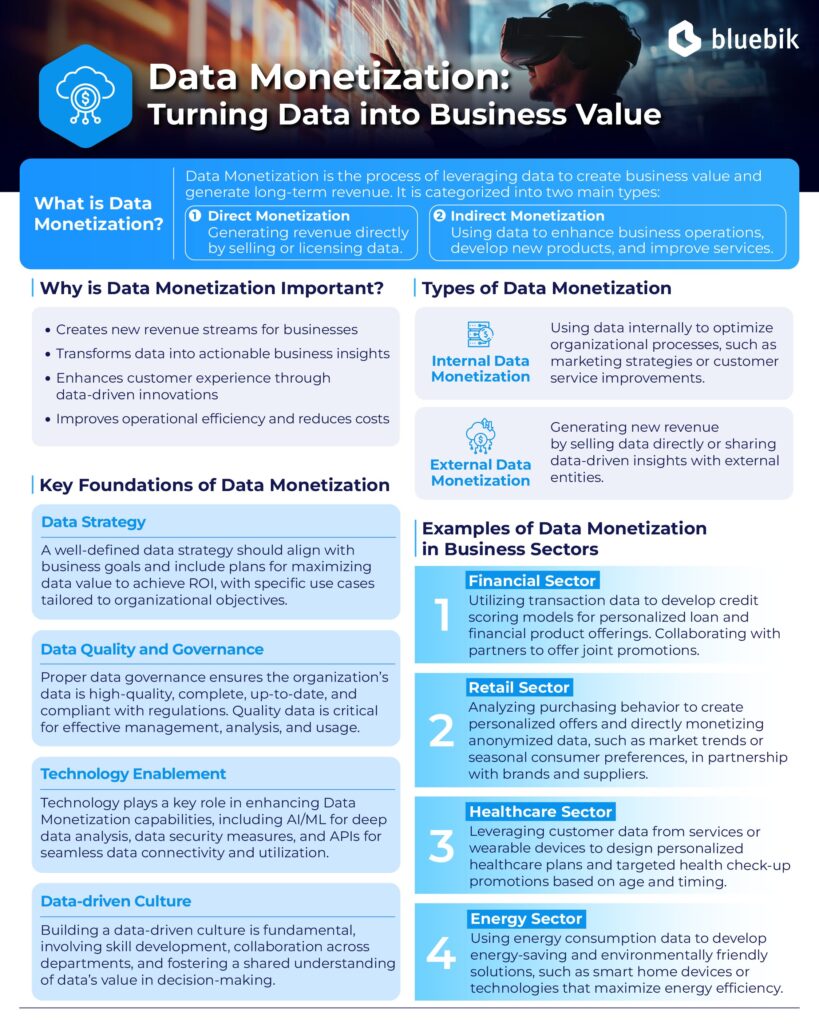In today’s world, data is abundant, and as organizations grow, the volume of data increases exponentially. Utilizing this available data helps enhance organizational capability and generate business value, acting as a key driver of competitiveness and long-term growth.
This article introduces Data Monetization, a strategy for turning data into business value from various perspectives, covering definitions, forms, foundational components, and real-world business applications.

What is Data Monetization?
Data Monetization involves using data to create long-term business value and generate revenue. Organizations can analyze available data to uncover deep insights, patterns, and trends that drive value creation. Generally, Data Monetization is categorized into two types:
- Direct Monetization – Generating revenue directly from data.
- Indirect Monetization – Leveraging data to develop new products and services.
Why is Data Monetization Important?
- Generates new revenue streams for businesses.
- Transforms available data into valuable business insights.
- Enhances customer experience through personalized interactions.
- Improves operational efficiency and reduces costs through data-driven processes.
Forms of Data Monetization
• Internal Data Monetization:
Utilizing data within the organization to improve decision-making and business processes, such as:
- Enhancing operational efficiency through data-driven decisions.
- Personalizing products and services to improve customer experience.
- Identifying trends and opportunities for innovation and growth.
- Optimizing supply chains to improve performance and reduce expenses.
• External Data Monetization:
Generating new revenue by offering data-related services, such as:
- Collaborating with external partners to share deep business insights.
- Offering data-driven products like market research services.
- Providing advanced analytics solutions to other businesses.
Foundational Components of Data Monetization
• Data Strategy:
A well-aligned data strategy should support business goals by transforming available data into deep insights, creating new business opportunities, ensuring ROI, and delivering practical use cases.
• Data Quality and Governance:
Robust data governance ensures data accuracy, completeness, and relevance while complying with regulatory requirements. High-quality data is essential for analysis and usage across various business processes.
• Technology Enablement:
Technology plays a key role in enhancing Data Monetization, including AI/ML for deep data analysis, improved data security, and APIs for seamless data integration and usage.
• Data-driven Culture:
Establishing a data-driven culture involves building relevant skills, fostering cross-departmental data sharing, and promoting collaboration for data-driven decision-making.
Examples of Data Monetization in Business
• Financial Services:
Financial businesses can leverage large datasets from customer transactions, market trends, and risk assessments to generate both direct and indirect revenue.
Example: Utilizing transaction data to develop credit scoring models, offering loans and financial products, or collaborating with partners for joint promotions.
• Retail:
Retailers can monetize customer behavior and purchase history data to analyze deep insights for marketing campaigns, product pricing, or inventory management.
Example: Analyzing customer purchase behavior to provide personalized offers or generating revenue from anonymous data by sharing consumer trends with brands and suppliers.
• Healthcare:
Healthcare providers can monetize patient data, treatment histories, and service usage to enhance tailored care.
Example: Using wearable device data to design personalized healthcare packages and promote age-specific health checkup campaigns.
• Energy:
Energy businesses can utilize in-depth data analysis to improve internal operations or develop new products and services.
Example: Using energy consumption data to develop energy-saving solutions like smart home devices or technologies optimizing energy efficiency.
Unlocking Business Potential with Data Monetization
Data Monetization unlocks a new level of business potential, turning existing data into innovations that create added value. Bluebik believes that organizations integrating data and technology rapidly will gain competitive advantages and continuous growth opportunities. Given the complexity of technology, seeking external expert consultations can be crucial for successful and ongoing transformation.
Businesses aiming to develop data and AI strategies to enhance competitiveness and drive growth can rely on Bluebik’s team of experts in Big Data & Advanced Analytics for comprehensive solutions, from strategy development to tailored implementation.
Contact us at:
✉ [email protected] | ☎ 02-636-7011
Reference polestarllp, gooddata, stibosystems, secoda












![Thumbnail [Post Event] HOW](https://bluebik.com/wp-content/uploads/2025/12/Thumbnail-Post-Event-HOW.png)